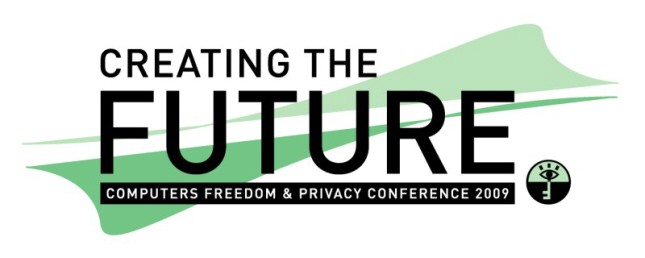
From the CFP2008 web page:
This election year will be the first to address US technology policy in the information age as part of our national debate. Candidates have put forth positions about technology policy and have recognized that it has its own set of economic, political, and social concerns. In the areas of privacy, intellectual property, cybersecurity, telecommunications, and freedom of speech, an increasing number of issues once confined to experts now penetrate public conversation. Our decisions about technology policy are being made at a time when the architectures of our information and communication technologies are still being built. Debate about these issues needs to be better-informed in order for us to make policy choices in the public interest.
This year, the 18th annual Computers, Freedom, and Privacy conference will focus on what constitutes technology policy. CFP: Technology Policy ’08 is an opportunity to help shape public debate on those issues being made into laws and regulations and those technological infrastructures being developed. The direction of our technology policy impacts the choices we make about our national defense, our civil liberties during wartime, the future of American education, our national healthcare systems, and many other realms of policy discussed more prominently on the election trail. Policies ranging from data mining and wiretapping, to file-sharing and open access, and e-voting to electronic medical records will be addressed by expert panels of technologists, policymakers, business leaders, and advocates.
Updates:
CFP2008 is being held in New Haven, Connecticut, on May 20-23. Back in 2000 Elizabeth Weise called it “the most important computer conference you’ve never heard of”; I think of CFP as the most important conference — and network of people and organizations — focused on civil rights (and increasingly, human rights in general) in an electronic society. Lorrie Faith Cranor’s Ten Years of Computers, Freedom and Privacy gives the early history, where hackers, lawyers, law enforcement, and goverment representatives fought out “crypto wars” and internet censorship battles (ending with a defiant “we’ll be back” from the Clinton adminstration as the Clipper Chip went to its well-deserved fate).
The technology policy focus is extremely timely. The upcoming election will feature significant differences between the parties and candidates on issues like net neutrality, warrantless surveillance, immunity for corporations who may have collaborated with illegal government wiretapping programs, Real ID, the McCain bill to censor social networks, and privacy — now on the national agenda thanks to MoveOn’s stance against Facebook’s Beacon.
Over the last several years, CFP has steadily broadened its horizons to take a more global view and pay increasing attention to perspectives that are getting overlooked: digital divide issues, normalization of surveillance and censorship by governments and corporations, hactivism, the special challenges of communities like the Mohawk Nation (spread over multiple jurisdictions), high school students in a panel organized by danah boyd in Seattle in 2005. After a few (in my humble opinion) rather bland and corporate years, things have taken a more activist turn: a 2003 New York walking tour by the Surveillance Camera Players, a 2005 demo by the ACLU that led to the US State Department changing policy on encryption and passports (props to State Department official Frank Moss for being there and taking the message back), Patrick Ball accepting his EFF Pioneer Award by satellite from Sri Lanka, where he was working with the truth and reconciliation commission. Last year in Quebec, during the height of Stop Real ID Now! grassroots activist campaign, a half-dozen coalition members ranging from libertarians to labor activists were there (as well as some people from DHS and elsewhere who strongly disagreed with us but were still willing to have very honest discussions), and Bruce Schneier’s keynote on the Psychology of Security for people on both sides of the debate.
The call for presentations, tutorials, and workshops asks for proposals on panels, tutorials, speaker suggestions, and birds of a feather sessions through the CFP: Technology Policy ’08 submission page. The deadline for panels tutorials, and speakers is March 17, 2008, and the birds-of-a-feather deadline is April 21.The list of suggested topics is really broad (I’ll include it in a comment) and so as always there are likely to be a lot more high-quality submissions than can easily fit; the program committee often merges and suggests changes to sessions to help squeeze more in. The submission process can seem a bit intimidating (this is an ACM conference and so it has some academic overtones) but the guidelines are helpful and have links to some examples.
So if there’s a topic you’d like to see covered, one or more speakers you think would be good, a presentation you’d like to give, a panel you’d like to organize, or a tutorial you’d like to attend (or provide), please think about submitting it. If you’re not sure whether it makes sense, feel free to give it a trial run in a comment here or just send me some mail.
If it seems like CFP means a lot to me, it does: I’ve been going there for over 10 years; my SO Deborah Pierce has been going even longer and chaired it in 2005. I’ve volunteered, asked questions, been on a panel, run a couple of BoFs, and taken photos of Deborah during the various sessions she’s appeared in or moderated, and this year I’m excited to be on the Program Committee. There are lots of friends and long-term acquaintances we only get to see in person at CFP — and every year we met a lot of new people. This year, with the two of us working together on Tales from the Net, and Computers, Freedom and Privacy 2008’s ambitious goal of “shaping public debate” on technology policy in an election year, I’m particularly looking forward to it!
jon

 One of our goals for the 2010
One of our goals for the 2010 
